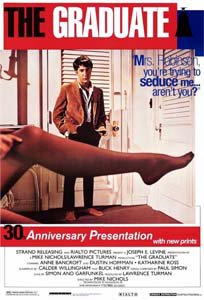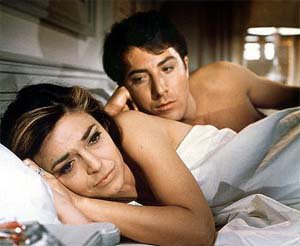 There are a lot of cinematically historic films that I’ve never seen… movies I know I should see, but just haven’t yet. You hear about these classic films so much, you’ve seen clips and scenes and hear quotes from them, but can never attach them to any actual moment in your life. It’s weird. Some of the movies I should have seen by now, but haven’t yet include Ben Hur (except the chariot race sequence), The Godfather trilogy and Raging Bull. There are plenty other classics I haven't seen yet... hec, it took me years to finally see Casablanca and today I finally got around to watching The Graduate.
There are a lot of cinematically historic films that I’ve never seen… movies I know I should see, but just haven’t yet. You hear about these classic films so much, you’ve seen clips and scenes and hear quotes from them, but can never attach them to any actual moment in your life. It’s weird. Some of the movies I should have seen by now, but haven’t yet include Ben Hur (except the chariot race sequence), The Godfather trilogy and Raging Bull. There are plenty other classics I haven't seen yet... hec, it took me years to finally see Casablanca and today I finally got around to watching The Graduate.The Graduate, of course, is a story about a college graduate, played by Dustin Hoffman, who is unsure of how to approach his future and ends up having an affair with his father’s partner’s wife, played by Anne Bancroft. Things get complicated when Hoffman falls in love with Bancroft’s daughter, played by Katharine Ross.
A couple of things came to mind as I watched this Mike Nichols’ directed classic…
First, the 1983 Tom Cruise film Risky Business has a lot in common with The Graduate. Cruise and Hoffman both play successful students of well-to-do families who are suddenly unsure of their future, questioning their given path for the first time in their lives.
In the 1967 The Graduate, it shows Hoffman obeying every one of the adults he comes in contact with, but not understanding any of the reasons behind their decisions. He reluctantly follows because he doesn’t have a direction of his own. It is a perfect reflection of the generation gap that most young people in the sixties were facing.
In the 1983 Risky Business, Cruise’s character responds to his suddenly rudderless existence by experimenting in excess, falling in love with a call girl, becoming a pimp and making a lot of money. This is a perfect reflection of the eighties, where the motto “greed is good,” as Michael Douglas said in Wall Street, was the culture at the time. When it doubt, indulge.
 Cruise and Hoffman’s characters are basically the same people, they simply react to the unknown by the forces driving their culture at the time.
Cruise and Hoffman’s characters are basically the same people, they simply react to the unknown by the forces driving their culture at the time.Second, this film, for the first time, made me understand, to some extent, where the children of the sixties were coming from. It seemed as if the heyday of post-World War II had created a level of abundance and a strong middle class. This middle class followed the societal rules of the 30’s and 40’s, with the old fashioned roles of men and women, of cocktails after work and of cookouts on the weekends.
By the sixties, it looks as if all of those buildings of the 40’s and 50’s were in need of repair and the people, who have lived in abundance, had lost the meaning behind their roles in society… as if they were shallow examples of what they once were. The middle classes shown in the film resembled people at dawn, at the end of an all night party… they’re still dressed nice, but look tired and hollow. So, these middle class children grow up following their parents’ examples, but don’t see the sacrifice that created it. They just see the abundance and the materialism and shallowness of their parents and wonder… if that’s the end result of following the rules, then maybe the rules need to be revisited.
 At least, that’s what I got out of the film. Hoffman’s performance is wonderful as he is basically invisible, just another cog in the societal machinery, taken advantage of by Bancroft’s Mrs. Robinson and being pushed toward graduate school by his parents… it’s only when he finds love in Katharine Ross that his life finally gets direction, a purpose and he follows that drive at the risk of alienating everyone.
At least, that’s what I got out of the film. Hoffman’s performance is wonderful as he is basically invisible, just another cog in the societal machinery, taken advantage of by Bancroft’s Mrs. Robinson and being pushed toward graduate school by his parents… it’s only when he finds love in Katharine Ross that his life finally gets direction, a purpose and he follows that drive at the risk of alienating everyone.I can see why this film was such a touchstone for that generation. It’s a wonderful portrayal of the clashing of generations in a very effective way.
I know I should have seen The Graduate much sooner than this, but, in a way, I’m glad I didn’t. Otherwise, I don’t think I would have appreciated it as much.






2 comments:
That's hilarious! Do I remember seeing pictures of that, or was there more than one time Jack dressed up as a woman?
It's a shame really, that I was in NY when John got his first real kiss! Wish I was there.
This was a good analogy of the film Pete but I think you missed something very important. I believe this movie gave people permission. Permission to sin and think it as 'good'. This movie was all the rage, much like Peyton Place was on TV. Did the industry NEED to show this stuff? Hardly.
Post a Comment